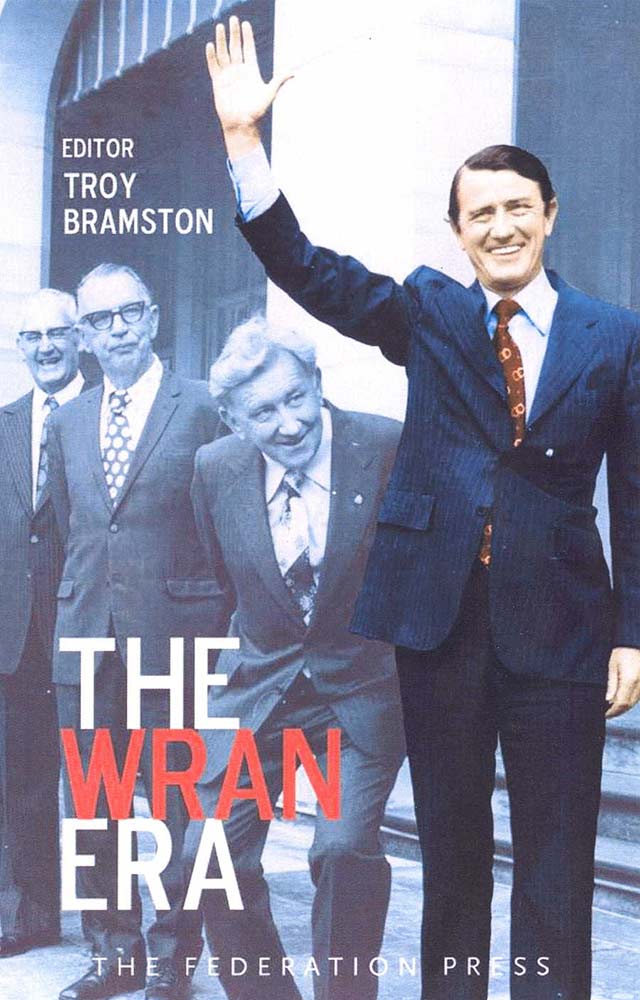For over a decade, from 1976 to 1986, Neville Wran led the most successful Labor Government in New South Wales history.
Now, for the first time, key ministers, advisers, public servants, party and union officials, and Wran himself, provide a critical retrospective on the era and its legacy today.
It was an era of unrivalled electoral success – four electoral victories were won, including two ‘Wranslides’ in 1978 and 1981. Wran was a hugely popular leader who galvanised Labor supporters around the nation, and provided the model for modern Labor leadership and government.
It was also an era of sound economic management and moderate progressive reform which transformed New South Wales in ways taken for granted today.
Significant policy achievements, and some mistakes, are noted in health, education, transport, conservation, consumer affairs, Aboriginal affairs, the status and rights of women, industrial relations, anti-discrimination and equal opportunity law reform, the arts and heritage protection, the public service, and electoral and institutional reform.
The contributions cover key policy areas, politics and elections. The candid views of the main players are balanced with those of academics, journalists and commentators. New interviews, original research and fresh analysis combine to provide a unique perspective on The Wran Era.
Foreword
Neville Wran
Foreword
Mark Arbib
Preface
Contributors
Abbreviations
Introduction
Troy Bramston
Part One: The Wran Era and Political Style
The Path to Power
Brian Dale
Elections, Policy and Politics: An Overview
David Clune
The ‘Wranslides’ and Electoral Politics
Antony Green
The Wran Leadership Model
Troy Bramston
Part Two: Managing Government
Working for Wran
David Hill
The Wran Cabinet
Rodney Cavalier
The Public Service
Gerry Gleeson
Neville Wran: The Voice of Sydney
Graham Freudenberg
Wran and the Media
Rodney Tiffen
Part Three: Policy and the Wran Government
Health
Laurie Brereton
Education
Michael Hogan
Transport
John Black
The Economy
Russell Ross
Policing, Law and Order
Andrew Clark
Social Policy
Gary Moore
Social Policy and the Reform Agenda
Frank Walker
The Environment: Reform, National Parks and City Decline
Jeff Angel
Women’s Policy: Courage with Caution – The decade in which NSW led the world in women’s rights
Carmel Niland
An Aboriginal Perspective
Pat O’Shane
Reforming the Institutions of Governance
David Bradbury
Neville Wran and the Labor Council of NSW
Michael Easson
Part Four: Reflections and Assessments
Reflections of a Minister
Terry Sheahan
An Assessment from the Outside
Dennis Shanahan
An Assessment from the Inside
Stephen Loosley
Appendix 1: Neville Wran’s Resignation Speech, 7 June 1986
Appendix 2: Cabinets and Ministries 1976-86
Appendix 3: NSW Leaders of the Opposition 1976-88
Appendix 4: Election Results 1973-86
Notes and Additional Sources
Index
This book will appeal more to Wran’s fans than his critics but it is a timely overview of the way that his leadership shaped New South Wales and how his style changed the way politics was played across the country. As someone who found Wran to be a charismatic and visionary politician, despite the inevitable missteps of his government, I found this book revealing, insightful and a reminder of what can be achieved when governments think it is important to strengthening the social fabric of our community, when idealism is married with pragmatism.
National Indigenous Times, 27 July 2006
While much of the material on Wran’s achievements and style will be familiar to students of politics, it has not been presented previously in such a comprehensive collection. What makes this volume unique is that contributors sometimes provide stimulating insights or provide genuine ‘inside dope’ on the politics within the Wran Governments … By gathering writers of diverse backgrounds, each producing largely original material, the editor has ensured a healthy range of perspectives … The volume provides excellent material for reflection and further research and so deserves to stand as an important addition to the historical record … If aspiring leaders manage to study only one premier or prime minister, Wran should be the one.
Tony Smith, Australian Review of Public Affairs, 18 June 2006
Thirty years after Balmain-born Neville Wran led the NSW Labor party to victory in May 1976, with a one-seat majority, it seems timely to reflect upon the performance of his governments. For the decade Wran was in power he transformed state politics in New South Wales … The three highlights in this eclectic collection come from Rodney Cavalier, Graham Freudenberg and Stephen Loosley.
Ross Fitzgerald, The Sydney Morning Herald, 10 June 2006
The collective contributions in this book suggest there is room for a re-evaluation of the Wran record … this book provides insights into an absorbing period in politics.
Mike Steketee, The Australian, 3 June 2006
It’s a must-have for anyone interested in politics.
Stan Denham, The Daily Telegraph, 20 May 2006
If there were a Neville Wran anywhere in Australian Labor politics today, you can bet he would be on a fast, sealed train to Canberra. “Nifty” was no also-ran, and, on the 30th anniversary of his coming, this collection of essays, reminiscences and reflections celebrates the decade that belonged to the master of “razzle dazzle”.
It’s almost worth buying just to read Graham Freudenberg’s astute and evocative assessment of Wran’s key attribute – that he was the “voice” of Sydney.
As other commentators point out, including editor Troy Bramston, Wran was also the one who kept the flag of Labor flying in the darkest days after the Whitlam sacking when even some insiders thought the party might not survive. Divided into four sections – style, management, policy and assessment – it brings together a list of commentators that includes Laurie Brereton, Pat O’Shane, Dennis Shanahan, Andrew Clark and others.
Steven Carroll, The Age, 20 May 2006




